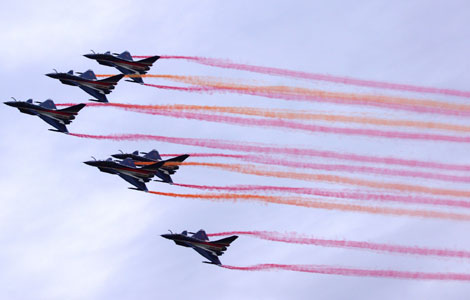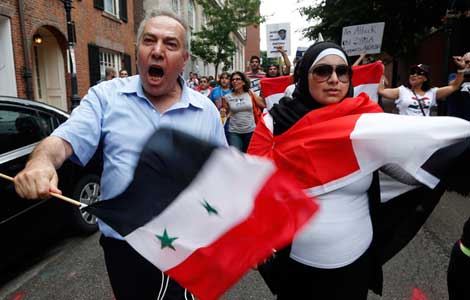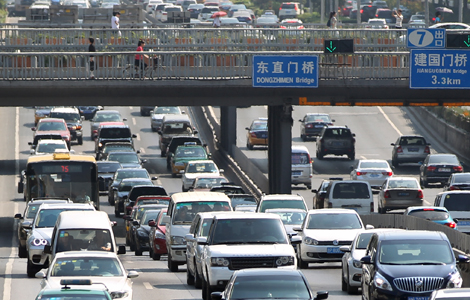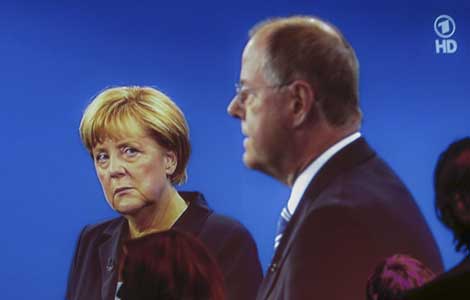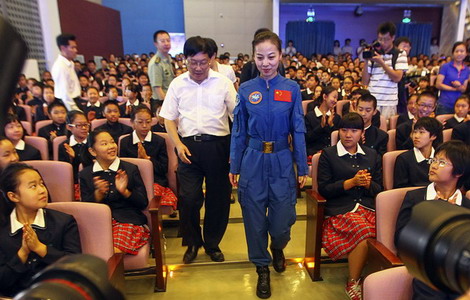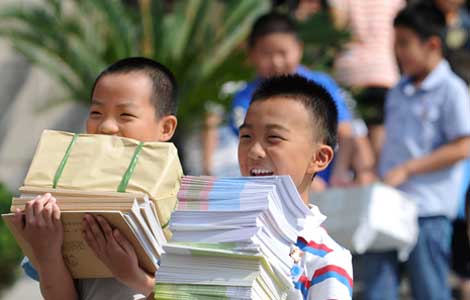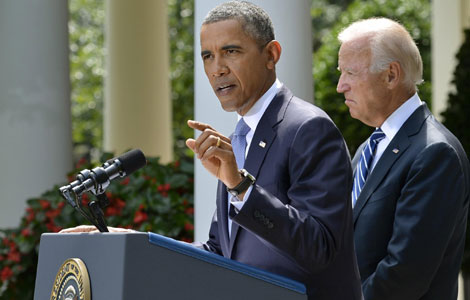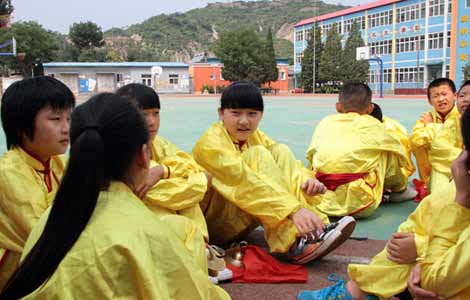Tough task for new WTO chief
Updated: 2013-09-02 07:39
By Amitendu Palit (China Daily)
|
||||||||
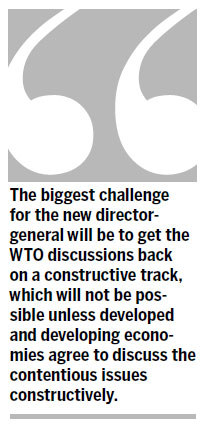
The World Trade Organization begins a new chapter from Sept 1 with current director-general Pascal Lamy of France stepping down and Roberto Azevedo of Brazil assuming charge.
Azevedo will be the first Latin American director-general of the WTO. In fact, many have interpreted Azevedo's "election" as the head of the world's top trade body as a victory for developing countries. His closest contender for the job was Mexican nominee Herminio Blanco, who reportedly enjoyed the backing of the United States, the European Union, and other members of the Organization for Economic Cooperation and Development, including Japan and the Republic of Korea.
Azevedo's eventual selection reflects the rift between the developed and developing countries in shaping the WTO's agenda for global trade and also the clout that developing countries as a group now enjoy at the WTO.
The Organization for Economic Cooperation and Development member states want the WTO agenda to stress on trade facilitation, government procurements, State-owned enterprise reforms, competition policy, intellectual property rights, labor standards and the environment. Developing countries are strongly sensitive to these issues, because acting on these "behind-the-border" issues involves introducing complex changes in domestic regulations.
While such changes will allow developed countries to gain greater access to developing economies' markets, particularly in sectors in which richer countries have greater comparative advantages like knowledge-based services, most developing countries will gain little by making new domestic regulations in these areas. As a result, the developing world has been reluctant to move on these issues and, with Azevedo as the director-general, it hopes the WTO will resist the efforts of OECD member states to pack the multilateral trade agenda in a manner of their choice.
Azevedo's selection reflects the strategic influence of developing countries on the WTO. But will developing countries be able to use this influence constructively to reshape the multilateral trade agenda? Developing countries as a group have not yet succeeded in creating a homogeneous alternative "non-OECD" vision for world trade. They have mostly ended up stalling negotiations at the WTO without suggesting other feasible options. This was especially evident during Lamy's tenure as WTO director-general.
So the biggest challenge for the new director-general will be to get the WTO discussions back on a constructive track, which will not be possible unless developed and developing economies agree to discuss the contentious issues constructively. Reaching such an agreement will be exceedingly difficult given the inherent mistrust between the developed and developing worlds, although Azevedo's choice of deputies shows he is keen on achieving this convergence.
His four deputies will be from the US, Germany, China and Nigeria. The choice not only underpins equal representation from the developed and developing worlds, but also symbolizes the most critical geo-political entities influencing modern trade.
The US and Germany are two major members of the G8 and initiators of the trans-Atlantic trade agreement being discussed by the US and the EU. China is one of the world's top trading countries and the most strategically influential developing economy in world trade negotiations. It also represents the BRICS(Brazil, Russia, India, China, South Africa) group of emerging economies that are positioned between the OECD member states and other developing countries in the global economic hierarchy.
Finally, Nigeria not only represents Africa, but also the large number of low-income economies with abundant natural resources and sub-optimal industrial structures, which have, until now, remained marginal players in global trade.
So along with working to build convergence and consensus among WTO members, Azevedo and his deputies will also have to maintain the trade body's strategic significance in a world getting dominated by what the outgoing WTO director-general referred to in his farewell address as "mega-regional" trade deals. Most of these deals, such as the Trans-Pacific Partnership and trans-Atlantic deal between the US and the EU, are being spearheaded by the OECD member states.
The motivation for the deals comes from the frustration caused by the lack of progress at the WTO. Many of the new regional trade pacts being discussed, as well as bilateral trade agreements either concluded or being negotiated, include issues like intellectual property and government procurements that developing countries are sensitive to. Formalization of more such deals that include these issues may create a situation where the WTO's multilateral trade framework starts reflecting trade architecture very different from those prevailing in regional and bilateral preferential trade agreements.
The new chief of the WTO could have hardly assumed office under more difficult circumstances. He has to not only restore the world's faith in multilateral trade and the WTO's ability to manage it successfully, but also to recharge global trade in order to revive the global economy. Let us hope he succeeds in resurrecting the WTO, which is suffering from a serious crisis of confidence within two decades of its creation.
The author is head of partnership and programme and senior research fellow at the Institute of South Asian Studies in the National University of Singapore.
(China Daily USA 09/02/2013 page12)
Most Viewed
Editor's Picks

|

|

|

|

|

|
Today's Top News
Top companies should adapt to slower growth
DPRK blames US for canceled envoy visit
Chinese economy 'very strong' in long term
Sowing the seeds of sustained growth
Experts: US unwise to wage war on Assad
Visas for China get simplified
DPRK rescinds invite to US envoy
SASAC head target in graft probe
US Weekly

|

|
